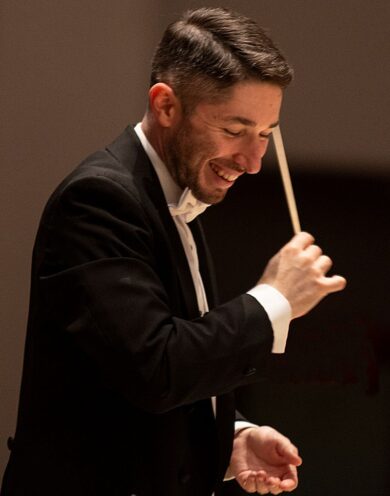Soloists and choral singing lift Master Chorale’s Verdi “Requiem”

Brett Karlin led the Master Chorale of South Florida in Verdi’s Requiem Thursday night in Fort Lauderdale.
Giuseppe Verdi’s Requiem is one of the great liturgical music dramas. Written in 1874 upon the death of the Italian poet and writer Alessandro Manzoni, the score is Italian grand opera writ large in a sacred context. The work requires four outstanding vocal soloists and large choral and orchestral forces plus a conductor who can fuse the theatrical and spiritual elements of the 90-minute opus.
On Thursday night, Brett Karlin led the Master Chorale of South Florida, the Lynn University Philharmonia and four exceptional singers in a performance at The Parker in Fort Lauderdale that went a long way toward fulfilling the score’s complexities.
In the decade that Karlin has been at the helm of the Master Chorale, he has achieved wonders with a chorus that had often been uneven and unwieldy prior to his directorship. Those virtues were fully on display in the unanimity and sculpted dynamics he drew from the singers in their traversal of Verdi’s masterpiece. The male singers, once a weak link, were particularly strong, their initial entrance firm and solid. In the “Dies irae,” the chorus rose to the challenge, with the big choral climaxes registering tremendous impact.
Karlin evoked the joyous spirit of the Sanctus, drawing vociferous corporate vocalism. The chorus brought extra bite to the return of the day of wrath theme in the concluding “Libera me.” The choral fugal lines were clean and robustly sung. In this demanding opus, the chorus hit a new level of consistency and musicality.
Karlin led a mostly straightforward performance, allowing the music to speak for itself. The brisk opening chords of the “Dies irae” thundered and the lyrical flow of the “Offerertorio” was well defined. At times, a more nuanced, idiomatic approach would have been welcome. The tempo of the “Agnus Dei” slowed to a crawl and, for all of Karlin’s attention to detail, the operatic melodrama was sometimes in short supply.
Performing Verdi’s massive score with a student orchestra is a daunting task and that may have hindered Karlin’s interpretive options. To be sure, much of the Lynn University Philharmonia’s playing was admirable. The crucial horn parts were solidly assayed and the offstage trumpets rang through the house resoundingly, announcing the day of judgement. Most of the orchestral sections were well accounted for but the strings tended to sound scrawny and underpowered. The important string figures beneath the chorus in the “Sanctus” were mostly inaudible.
From their first entrance in the “Requiem and Kyrie,” the four soloists brought distinction and a shot of adrenaline to the performance. Replacing the originally scheduled Mario Chang, Arturo Chacón Cruz (Mario Cavaradossi in Florida Grand Opera’s current production of Puccini’s Tosca) was nothing less than superb. His voice has real ring but he can float the most beautiful soft tones. In the big “Ingemisco” solo, Chacón-Cruz’s intensity of expression and legato phrasing were the essence of bel canto in the best sense of the term.
Perhaps the evening’s biggest surprise was mezzo-soprano Lindsay Kate Brown. A graduate of the Houston Grand Opera Studio, Brown had the fiery articulation of a true Verdi mezzo. With low tones that hit the contralto range, her every utterance riveted attention for sheer intensity and dramatic penetration.
Brown’s timbre blended perfectly in duets and ensembles with soprano Robyn Marie Lamp. Lamp’s rich sound and artfully deployed edge at the top effectively took center stage in the “Libera me.” Her high C over orchestra and chorus generated sparks but her radiant pianissimos proved most distinctive. Lamp’s final prayer “deliver me” was the culmination of a deeply felt performance. The audience appropriately held its applause, allowing the conclusion’s emotional catharsis to come through.
Richard Ollarsaba adroitly held up the quartet’s low end with a basso-cantante voice both mellow and powerful. His bottom notes in the “Confutatis” were firm and he brought elegance to his vocal production, avoiding the exaggerated histrionics or gravely sonority some basses evidence in this music. In their trio and quartet sections, the soloists’ blending, balance and coordination were outstanding.
Despite its flaws, this Verdi Requiem was an impressive achievement. There are two remaining performances.
The Master Chorale of South Florida repeats Verdi’s Requiem 8 p.m. Saturday and 4 p.m. Sunday at Lynn University’s Wold Performing Arts Center in Boca Raton. masterchoraleofsouthflorida.org
Posted in Uncategorized
Leave a Comment
Fri Mar 31, 2023
at 10:30 am
No Comments






